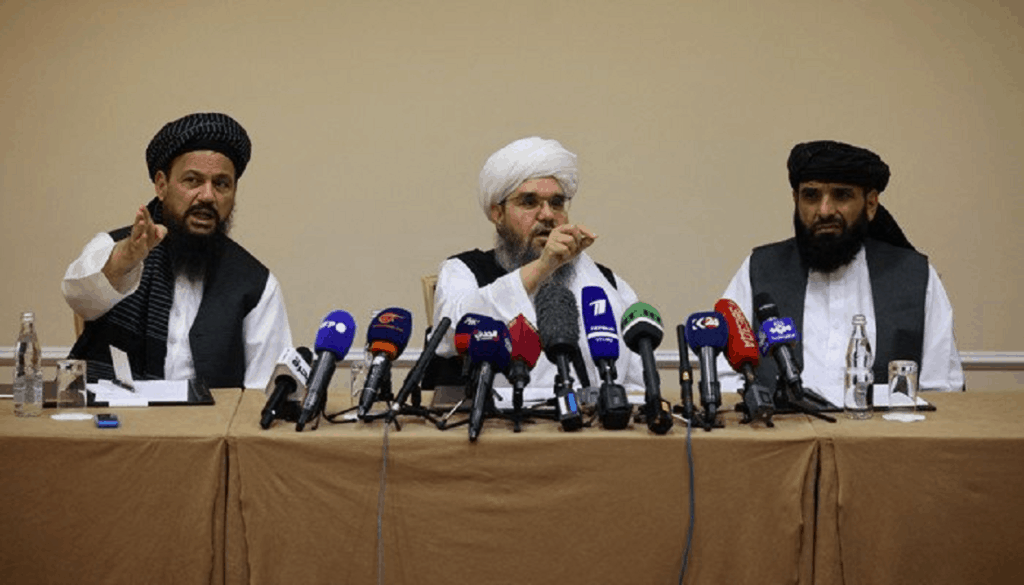By Nikola Mikovic
The Taliban appears to be destined to rule Afghanistan. The hardline Islamist group already controls large portions of the war-torn country, and it seems to be a matter of time before its fighters triumphantly capture the capital city of Kabul. How will that affect Russia’s positions in the region?

On July 9, the Taliban – designated by the Kremlin as a terrorist group – held a media conference in Moscow. Its representatives previously discussed the situation in Afghanistan with the Russian officials. Formally speaking, Russian authorities hosted terrorists. To be fair, the United States representatives also held talks with the Afghan movement on several occasions, even though Washington invaded their country in 2001 following the 9/11 terror attacks. Unable to effectively defeat the radical movement, the Pentagon is now withdrawing its troops from Afghanistan, and Russia reportedly fears that the Taliban could destabilize its client-states in Central Asia.
After more than 1,000 Afghan security personnel fled to neighboring Tajikistan in response to Taliban militant advances, Tajik President Emomali Rakhmon ordered the mobilization of 20,000 military reservists to bolster the border with Afghanistan. Moscow – Tajikistan’s ally – said that it would help stabilize the border “both directly and through a regional security bloc – Collective Security Treaty Organization (CSTO)”. Moreover, Russian Foreign Minister Sergey Lavrov recently pointed out that his country will do everything, including using its military base in Tajikistan, to defend its allies from the threat coming from Afghanistan, pointing out that obligations within the framework of the CSTO remain in full force.
It is worth remembering, however, that the Kremlin used exactly the same rhetoric in May after Azerbaijani troops reportedly advanced more than three kilometres (two miles) into southern Armenia, apparently trying to “lay siege” to Lake Sev Lich that is shared by the two countries. CSTO, however, never intervened to protect its member Armenia. In addition, the Russia dominated organization remained passive during the Nagorno-Karabakh conflict in the fall of 2020, which raised concerns in Armenia over its alliance with Russia. If, in the case of a potential Taliban incursion into Tajikistan (which is another CSTO member) the Kremlin does not openly protect its ally, it risks losing influence in the Central Asia.
At this point, however, such a scenario does not look very probable. The Taliban is preoccupied with strengthening its own positions within Afghanistan, and is aware that any attacks on its neighbors would affect its relations with countries such as Russia, China and Iran. The group’s leaders even emphasized that they see China as a friendly country and welcome it for reconstruction and developing Afghanistan. In other words, the Taliban promises not to provide support to the Uyghur militants from the volatile China’s Xinjiang province, and Beijing, for its part, is expected to include the war-torn country into its Belt and Road Initiative.
The Taliban has already vowed to support and protect the construction of the Turkmenistan-Afghanistan-Pakistan-India pipeline. When completed, TAPI will transport natural gas from the Galkynysh gas field in Turkmenistan through Afghanistan into Pakistan and then to India. Given that the mega project is worth $10 billion, it is very unlikely that major foreign powers did not make some deals with the Taliban to assure that the construction will go smoothly.
Besides gas, the Taliban seem to be interested in “narconomics” as well. Flow of drugs is expected to continue even after the group completely seizes power in Afghanistan. Although in 2000 the Taliban enforced a ban on poppy production, the United Nations Office on Drugs and Crime’s report estimates that the Afghan movement’s annual income is $400 million, half of which is likely to be derived from the illicit narcotics economy. When the US and British forces invaded Afghanistan in October 2001 poppies were grown on around 74,000 hectares – 285 square miles. The new figures showed production had increased more than four-fold in 15 years: now opium was being grown on 328,000 hectares – 1,266 square miles.
Russia has often criticized what it sees as an ineffective US effort to stop drug flows from Afghanistan and accused NATO forces of turning a blind eye to drug trafficking. Officially, Moscow is interested in curbing narcotics flowing into Central Asia and thence to Russia. In reality, neither the US ever intended to stop drug trafficking from Afghanistan to the West, nor did the Kremlin really attempt to prevent narcotics from reaching the Russian market. Drug trafficking is a business that brings enormous profits, and in this game both, the US and Russia, as well as some regional actors, are trying ensure as good position as possible.
Thus, the Taliban victory, following the US withdrawal from Afghanistan, suits most foreign actors operating in this turbulent part of the world. Moscow is expected to increase its influence in Central Asia allegedly protecting the region from “the Taliban threat”. China will get another market for its One Belt One Road investment program, while the US will save money it used to spend on the occupation of Afghanistan. It remains to be seen if the Afghan population will benefit from the nation’s “new reality”.
One thing is for sure. The real losers of this geopolitical game will be those Afghans who openly collaborated with the American occupiers over the past 20 years.
Author: Nikola Mikovic (Journalist, researcher and analyst based in Serbia. He covers mostly the foreign policies of Russia, Belarus and Ukraine)
(The views expressed in this article belong only to the author and do not necessarily reflect the views of World Geostrategic Insights).
Image Credit: Reuters







